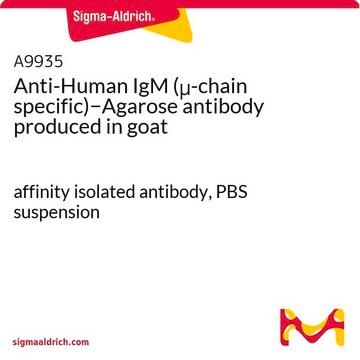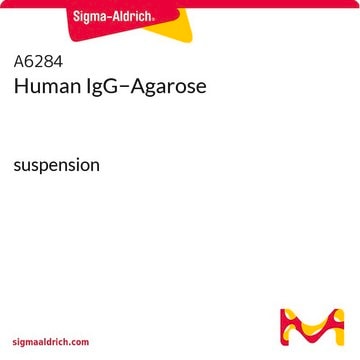A2691
Anti-Human IgA (α-chain specific)−Agarose antibody produced in goat
affinity isolated antibody, adsorbed with mouse and rat IgG
Sinonimo/i:
Goat Anti-Human IgA
About This Item
Prodotti consigliati
Origine biologica
goat
Coniugato
agarose conjugate
Forma dell’anticorpo
affinity isolated antibody
Tipo di anticorpo
secondary antibodies
Clone
polyclonal
Forma fisica
PBS suspension
Reattività contro le specie
human
Non deve reagire con
rat, mouse
Capacità
3-4 mg/mL binding capacity (human IgA)
Temperatura di conservazione
2-8°C
modifica post-traduzionali bersaglio
unmodified
Descrizione generale
Immunogeno
Applicazioni
Stato fisico
Esclusione di responsabilità
Not finding the right product?
Try our Motore di ricerca dei prodotti.
Codice della classe di stoccaggio
10 - Combustible liquids
Classe di pericolosità dell'acqua (WGK)
WGK 3
Punto d’infiammabilità (°F)
Not applicable
Punto d’infiammabilità (°C)
Not applicable
Certificati d'analisi (COA)
Cerca il Certificati d'analisi (COA) digitando il numero di lotto/batch corrispondente. I numeri di lotto o di batch sono stampati sull'etichetta dei prodotti dopo la parola ‘Lotto’ o ‘Batch’.
Possiedi già questo prodotto?
I documenti relativi ai prodotti acquistati recentemente sono disponibili nell’Archivio dei documenti.
Il team dei nostri ricercatori vanta grande esperienza in tutte le aree della ricerca quali Life Science, scienza dei materiali, sintesi chimica, cromatografia, discipline analitiche, ecc..
Contatta l'Assistenza Tecnica.






